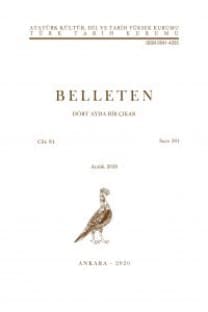Türk Tarih Kurumu'nun Genel Kurul Toplantısı (1 Nisan 1979)
Türk Tarih Kurumu'nun 1979 yılı olağan Genel Kurul toplantısı 1 Nisan 1979 Pazar günü saat 10 da Kurum merkezinde yapıldı . Kurum üyeleri saat 9,30 da Kurum'un kurucusu Atatürk'ün Anıtkabrini ziyaret ederek saygı duruşunda bulundular ve bir çelenk koydular. Kurum Başkanı Ord. Prof. Enver Ziya Karal şeref defterine şunları yazdı : "Atatürk! Düşüncelerin, duyguların ve ilkelerin dünyada yayılmaya devam ediyor. Geçen Kasım'da Paris'te toplanan 144 ulusun temsilcileri doğumunun 100. yıldönümünü kutlamaya karar verdiler. Bizler, kurmuş olduğun Türk Tarih Kurumu'nun üyeleri, sana bu haberi iletmeye ve bağlılık duygularımızı tekrarlamaya geldik". Saat 10 da Kurum merkezine dönen üyeler Genel Kurul toplantısına katıldılar. Oturuma 31 üye katıldı . Başkan çoğunluğun bulunduğunu söyleyerek kısa bir konuşma ile oturumu açtı. Geçen yıl asıl üyeliğe üç kişi seçilmişti. Bunlar Ankara Üniversitesi Dil ve Tarih - Coğrafya Fakültesi Klasik Filoloji Profesörü Dr. Suat Sinanoğlu, muhabir üyelerimizden Lahey Büyükelçiliği Müsteşarı Bilâl Şimşir ve muhabir üyelerimizden Ankara Üniversitesi Dil ve Tarih - Coğrafya Fakültesi Dekanı, Tarih Profesörü Dr. Yaşar Yücel idi.
Anahtar Kelimeler:
Türk Tarih Kurumu, Genel Kurul Toplantısı, 1 Nisan 1979
Turkish Contributions to Scientific Work in Islam
Mesopotamia and Egypt are the cradles of our present-day civilization. The origins of our science can be traced back to these two civilizations of four or even five thousand years ago. The Greeks inherited the science of these countries, appropriated it eagerly. They also endowed it with greater power of articulation and imparted fresh momentum to scientific work. In their hands scientific knowledge was not only considerably enriched, but it also gained substantially in refinement and theoretical stature. But with the advent of Christianity a period of stagnation gradually set in, and the era called the Dark Ages with all its superstitions and dearth of wellfounded scientific enlightenment began to weigh heavily upon the old classical Mediterranean world and the Near East. The situation changed with the advent of Islam. The history of Islam starts with the Hijra in 622 A. D. In that year Muhammed transferred the scene of his activities from the city of Mekka to Medina. The Prophet died ten years later, but before 650 the Arabs had managed to conquer Syria, Egypt, Mesopotamia, and Persia, and in these rapid conquests religious faith had served remarkably as a motive power for building a gigantic empire.
Keywords:
Turkish Contributions to Islam Scientific Work in Islam, History of Science, History of Islam,
- ISSN: 0041-4255
- Yayın Aralığı: Yılda 3 Sayı
- Başlangıç: 1937
- Yayıncı: Türk Tarih Kurumu
Sayıdaki Diğer Makaleler
Bizde Disseksiyon Ne Zaman ve Nasıl Başladı
Turkish Contributions to Scientific Work in Islam
Kur'an Harfleri ve Atatürk Devrimlerine Karşı Çıkışlar
Efes'teki Celsus Kitaplığı Onarım Çalışmaları
Ölenlerimiz - Ahmed Cemal Köprülü
Ankara Arkeoloji Müzesinde Bulunan Bir Portre Yüzü
Türk Tarih Kurumu'nun Genel Kurul Toplantısı (1 Nisan 1979)
III. Selim Döneminde Bursa Medreselerinde Disiplin Islahatına Ilişkin Bir Belge
